Making Sense with Sam Harris • Waking Up with Sam Harris

Episodes

#448 — The Philosophy of Good and Evil
In this episode of Making Sense, Sam Harris and his guest explore fundamental questions in moral philosophy through classic thought experiments. They examine how philosophers use these experiments to isolate specific ethical questions, discussing the famous trolley problem and its variations that reveal how people's moral judgments can shift based on subtle changes in circumstances.
The conversation delves into consequentialism—the theory that judges actions solely by their outcomes—and its limitations when applied to real-world moral dilemmas. Harris and his guest also examine Peter Singer's "Shallow Pond" thought experiment, which raises questions about moral obligations and the relationship between physical proximity and ethical duty, particularly in the context of global poverty and suffering.
Dec 8, 2025
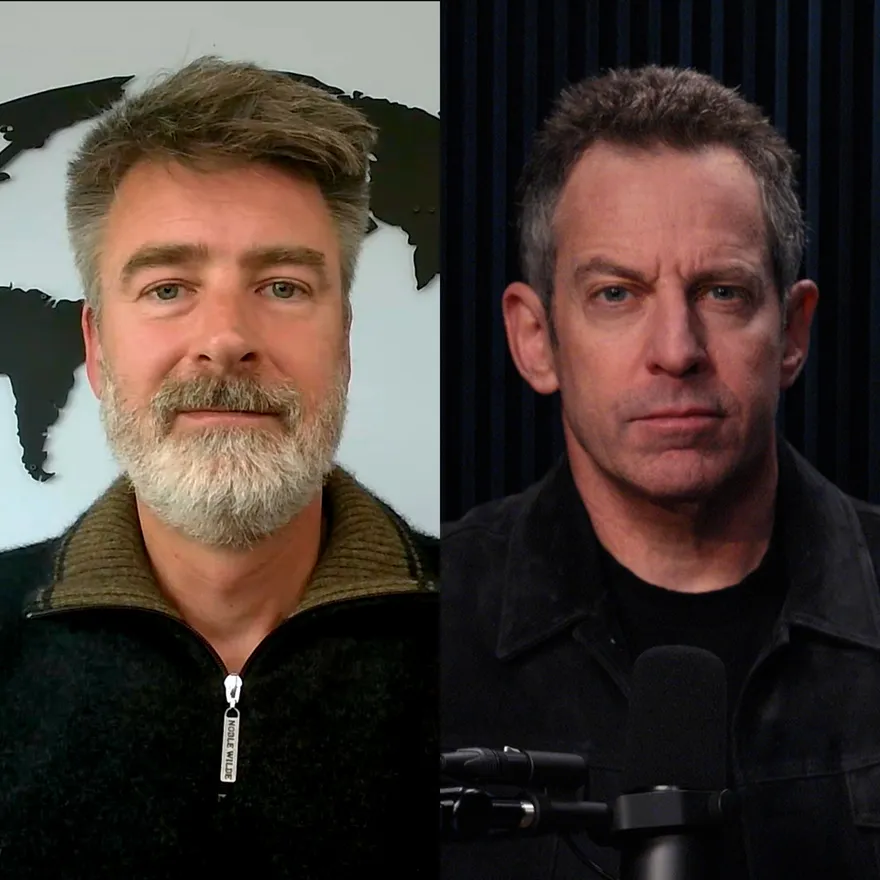
#447 — The Unraveling of American Power
In this episode of Making Sense, Peter Zeihan examines the impact of the Trump administration's trade and foreign policies on American manufacturing and global influence. The discussion explores how protectionist tariffs have affected different sectors of U.S. manufacturing, with simple operations showing some success in domestic relocation while complex industries face significant challenges. Zeihan also analyzes how the combination of deindustrialization and declining globalization could affect inflation and supply chains.
The conversation extends to the Trump administration's approach to international relations, particularly regarding Mexico and Venezuela. Zeihan discusses specific policy decisions, including the handling of drug cartels and maritime law enforcement, as well as questions about presidential military authority under the War Powers Act. The discussion touches on concerns about accountability and rule of law, including the controversial pardon of a former Honduran president.
Dec 4, 2025

#446 — How to Do the Most Good
In this episode of Making Sense, Sam Harris and Michael Plant explore major ethical frameworks, focusing on the differences between utilitarianism, consequentialism, and deontological ethics. Their discussion examines how these frameworks approach the concept of maximizing good outcomes, with Plant and Harris analyzing whether adherence to moral principles naturally leads to positive consequences.
The conversation delves into the role of happiness and well-being in ethical decision-making. Plant and Harris examine how to define and measure well-being, distinguish between happiness and positive experiences, and consider practical applications of happiness research. They discuss real-world examples, including how mental suffering in affluent societies compares to poverty in developing nations, and explore how this research can inform policy decisions.
Dec 1, 2025
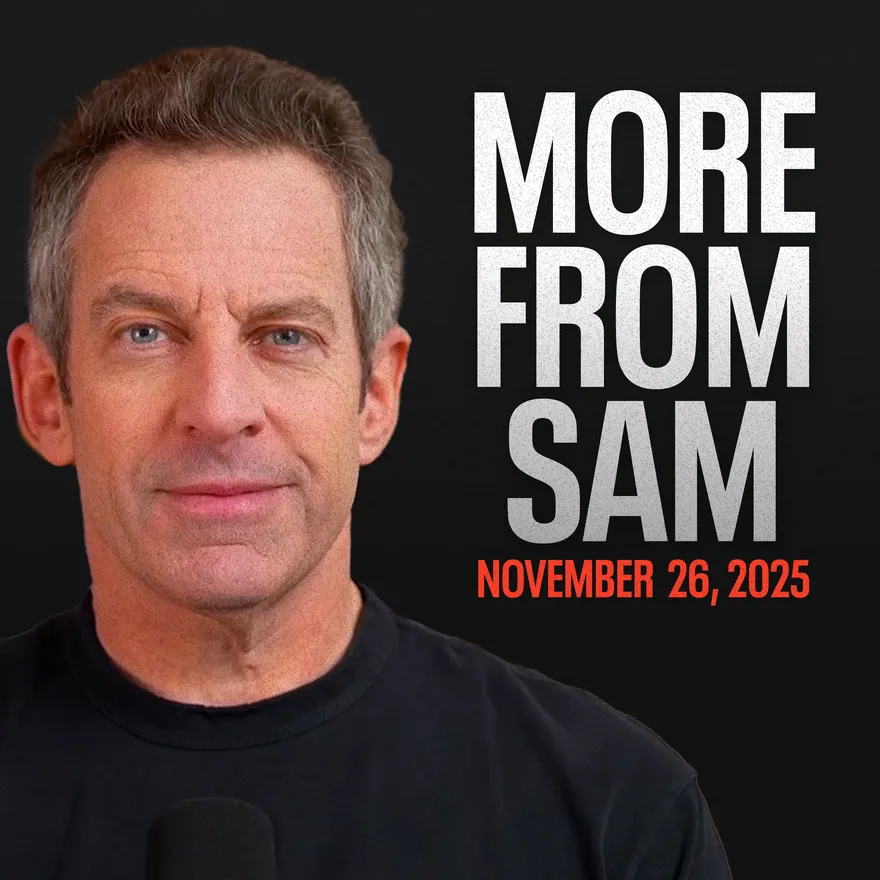
#445 — More From Sam: Marjorie Taylor Greene, Billionaires, Thanksgiving Political Debates, & Rapid Fire Questions
In this episode of Making Sense, Sam Harris shares insights from his comedy tour experiences, including an encounter with a heckler in Chicago and updates on venue performance across different cities. He then examines recent behavior and statements from political figures, focusing on Marjorie Taylor Greene's public apology and Elon Musk's shifting political alignments.
The discussion extends into broader themes about success, privilege, and the role of luck in personal achievements. Harris challenges common narratives about self-made success and explores how people often overlook the impact of circumstances and societal contributions in their accomplishments. He emphasizes the need for greater empathy toward those facing significant life challenges, using examples of homelessness and mental illness to illustrate his points.
Nov 26, 2025
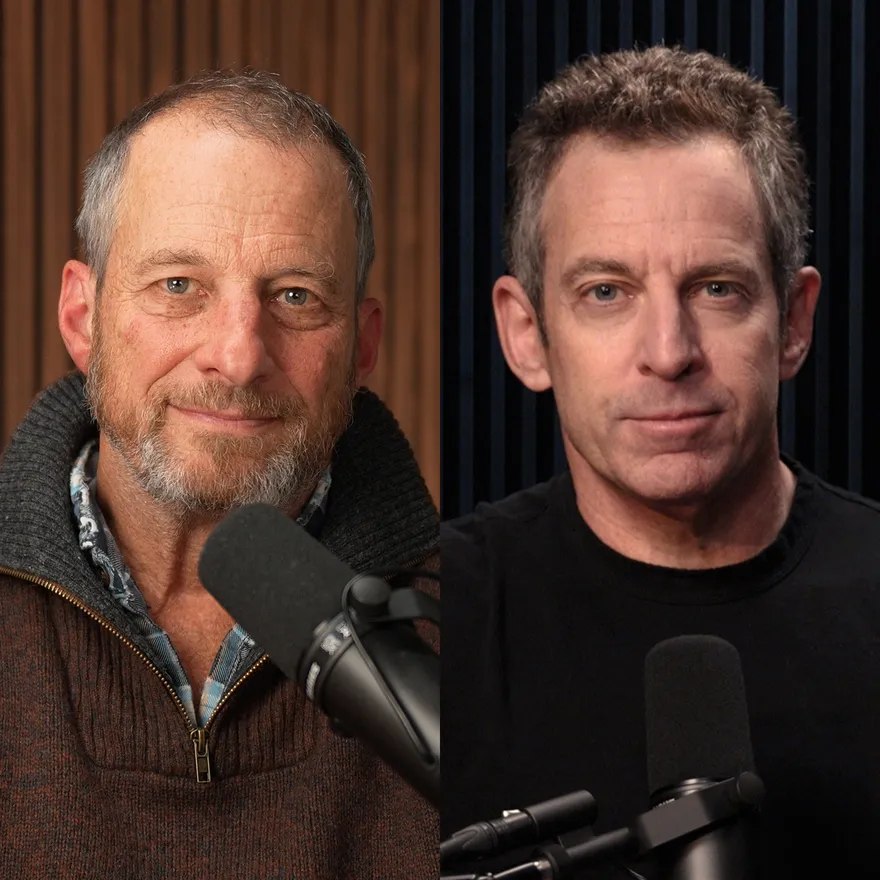
#444 — America's Zombie Democracy
In this episode of Making Sense, Sam Harris and George Packer examine the erosion of democratic institutions in the United States. Their discussion focuses on three key areas where traditional checks and balances are breaking down: the Justice Department's diminishing independence, Congress's surrender of constitutional powers to the executive branch, and concerning shifts within the military.
The conversation explores how corruption and ethical violations in modern politics have become normalized, with particular attention to the Trump administration's approach to accountability. Harris and Packer analyze the psychological and social mechanisms that allow democratic institutions to weaken without significant public resistance, including how widespread misconduct can shift ethical benchmarks and why political apologies often prove counterproductive in maintaining power.
Nov 17, 2025
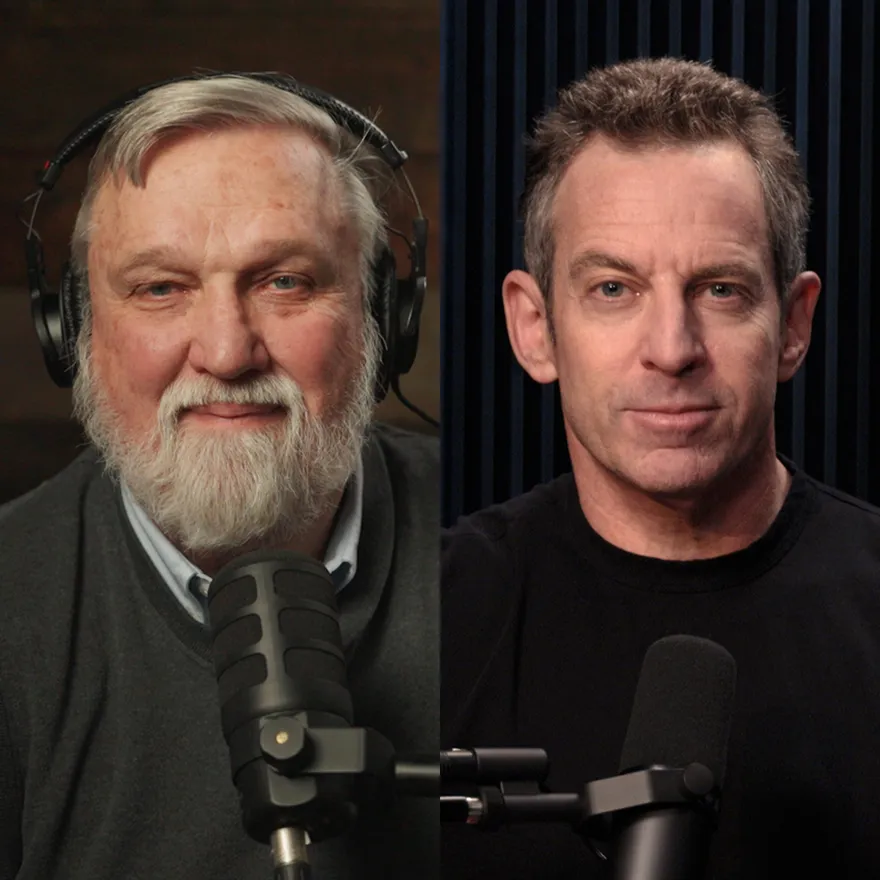
#443 — What Is Christian Nationalism?
In this episode of Making Sense, Douglas Wilson shares his perspectives on Christian nationalism and his religious background. As a self-described biblical absolutist and young earth creationist, Wilson explains his interpretation of scripture and discusses his views on how the Bible should be read and understood, including his position on end-times prophecies and their historical context.
The conversation explores Wilson's stance on the relationship between Christianity and governance. Wilson discusses what he sees as the effects of post-World War II secularism on society and outlines his vision for how Christian principles could inform government policy while maintaining the separation of church and state. He presents his views on implementing Christian morality in governance through non-coercive means and explains why he believes nations need transcendent moral standards.
Nov 10, 2025
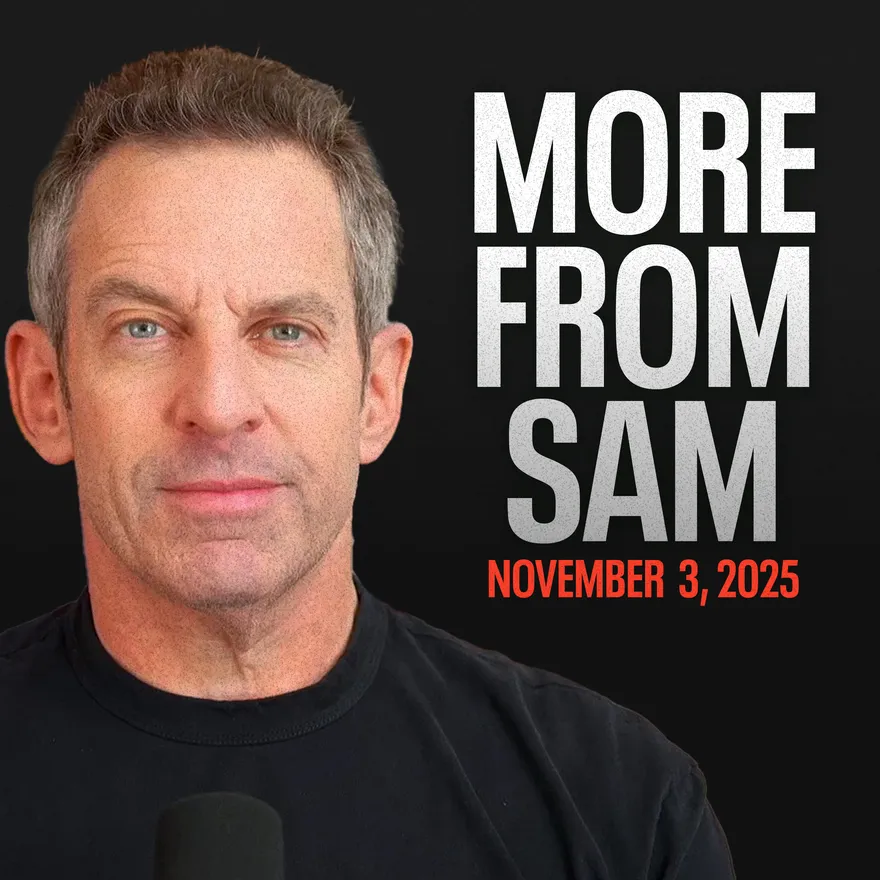
#442 — More From Sam: Public Speaking, Nuclear War, & Christian Nationalism
In this episode of Making Sense, Sam Harris discusses his transformation from someone who once declined being valedictorian to avoid public speaking to someone who now embraces speaking opportunities. Harris explains how he reframed his physiological responses to public speaking, shifting from viewing them as anxiety symptoms to seeing them as signs of positive anticipation.
The episode also covers Harris's analysis of nuclear deterrence policy and the psychological challenges of nuclear protocols, particularly regarding presidential decision-making in crisis situations. Harris examines the concept of Mutually Assured Destruction and current U.S. nuclear arsenal technology. Additionally, he touches on recent conversions to Christianity by public intellectuals, though he refers listeners to his Substack for more detailed discussions on this topic.
Nov 3, 2025
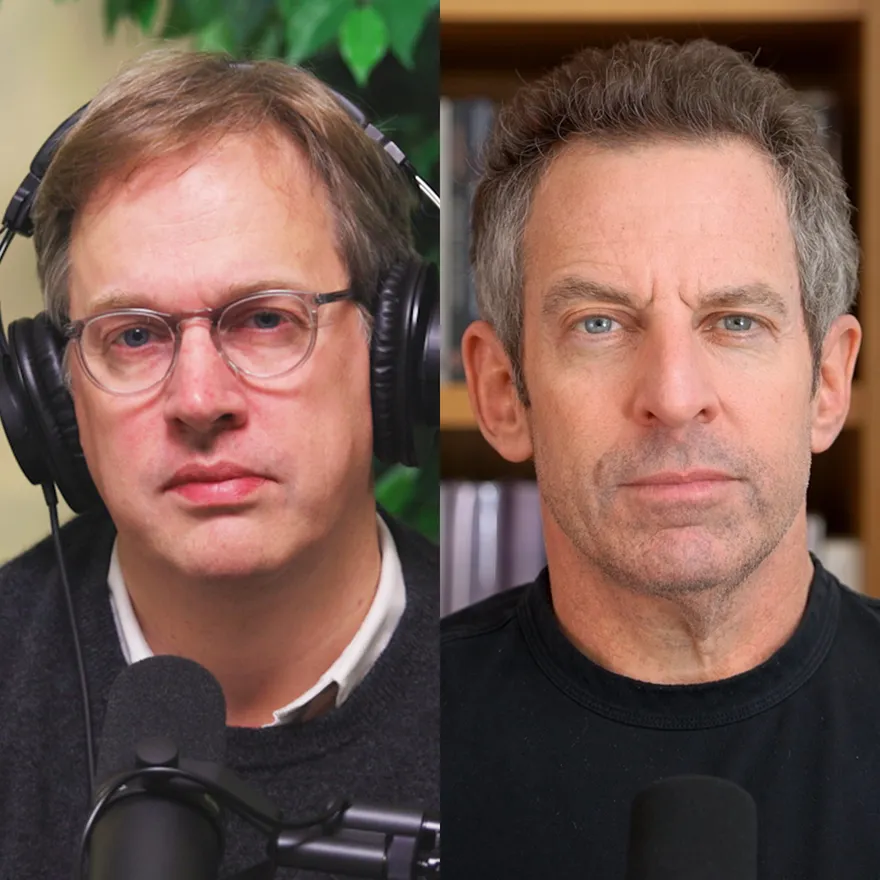
#441 — The Threat of Civil War
In this episode of Making Sense, Sam Harris and writer Stephen Marche examine the potential for civil conflict in the United States. Through a Canadian perspective, they analyze how US political instability affects international relationships, particularly noting a shift in Canadian sentiment toward viewing the US as an adversary rather than an ally.
The discussion explores several factors that could contribute to civil unrest in the US, including the approaching demographic shift to a minority-majority population by 2040, declining trust in institutions since 1980, and growing economic inequalities. Harris and Marche also address the current state of partisan division in US politics, which they note has reached levels not seen since 1876, and discuss how these tensions impact democratic norms.
Oct 31, 2025
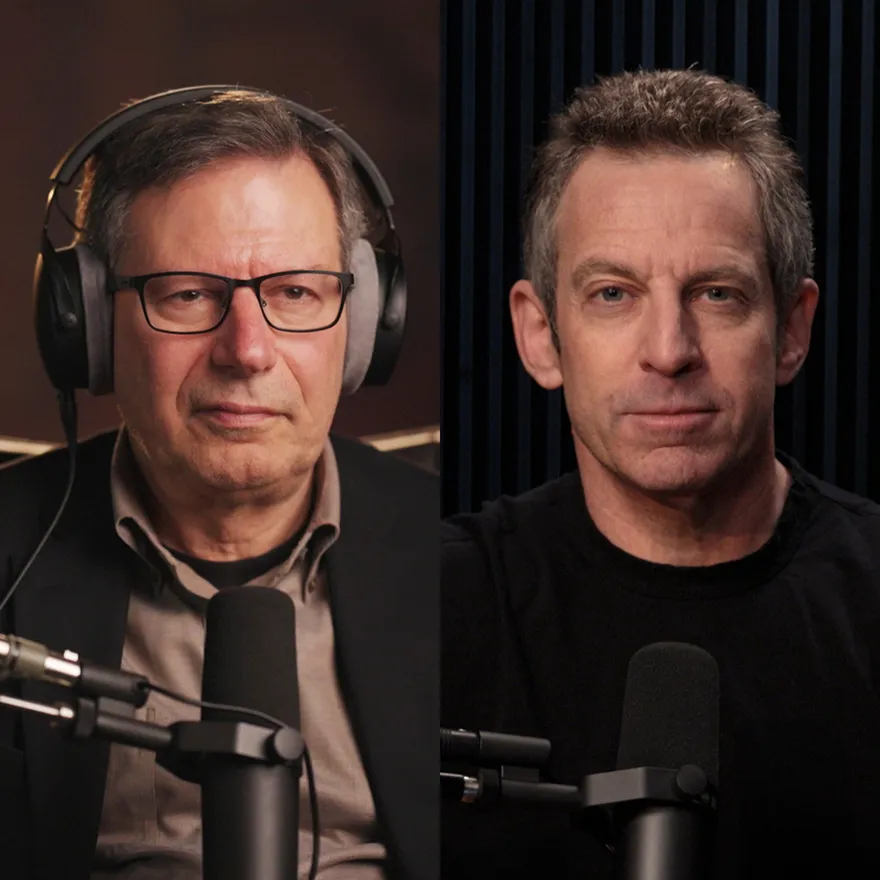
#440 — A World in Crisis
In this episode of Making Sense, Sam Harris and Robert D. Kaplan examine the current state of global instability. Kaplan shares how his unique approach to journalism, combining philosophy, geography, history, and literature, helped him accurately predict many of today's international conflicts and crises. The conversation explores how environmental degradation, population changes, and modern technological interconnectedness contribute to worldwide disorder.
The discussion delves into historical parallels between current global conditions and the Weimar Republic, with insights about balancing order and freedom in democratic institutions. Kaplan also analyzes Russia's position on the world stage, discussing Putin's leadership style, Russia's military capabilities as revealed by the Ukraine war, and potential scenarios for Russia's future stability.
Oct 24, 2025
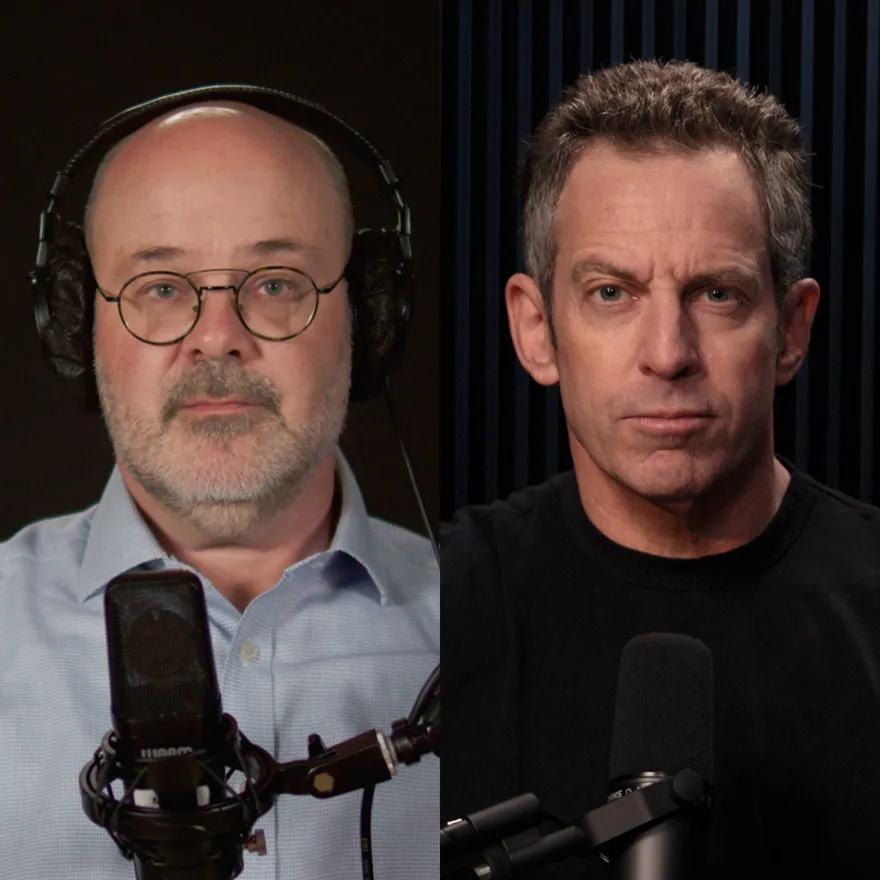
#439 — How to Lose a Democracy
In this Making Sense episode, Sam Harris and Damon Linker explore the evolution of American democracy and potential threats to its stability. Linker, who shifted from being a conservative voice at First Things magazine to identifying as center-left, shares his perspective on the changing political landscape and his growing concerns about authoritarian tendencies in modern politics.
The conversation examines various aspects of political transformation, from immigration policy to the potential for civil unrest. Harris and Linker discuss the rhetoric of key political figures, the use of law enforcement tactics, and draw comparisons between current American political tensions and historical periods of unrest in other nations. They also address concerns about how political violence might be used to justify expanded government authority.
Oct 14, 2025

#438 — “More From Sam”: Israel-Hamas Deal, Qatari Air Force Base, Trump, Charlie Kirk, Ezra Klein, & Rapid Fire Questions
In this episode of Making Sense, Sam Harris examines several current geopolitical and domestic issues. The discussion covers Trump's approach to Middle East diplomacy, including his business connections in the Gulf region, and analyzes the prospects for peace in the Middle East. Harris also explores Qatar's role in regional politics and its influence on American institutions.
The conversation extends to concerns about political leadership and social stability in the United States. Harris uses Trump's golf habits as a starting point to discuss broader questions about character and corruption in politics. The discussion also addresses the potential consequences of political violence and growing societal divisions, including their effects on institutional trust and national unity.
Oct 11, 2025
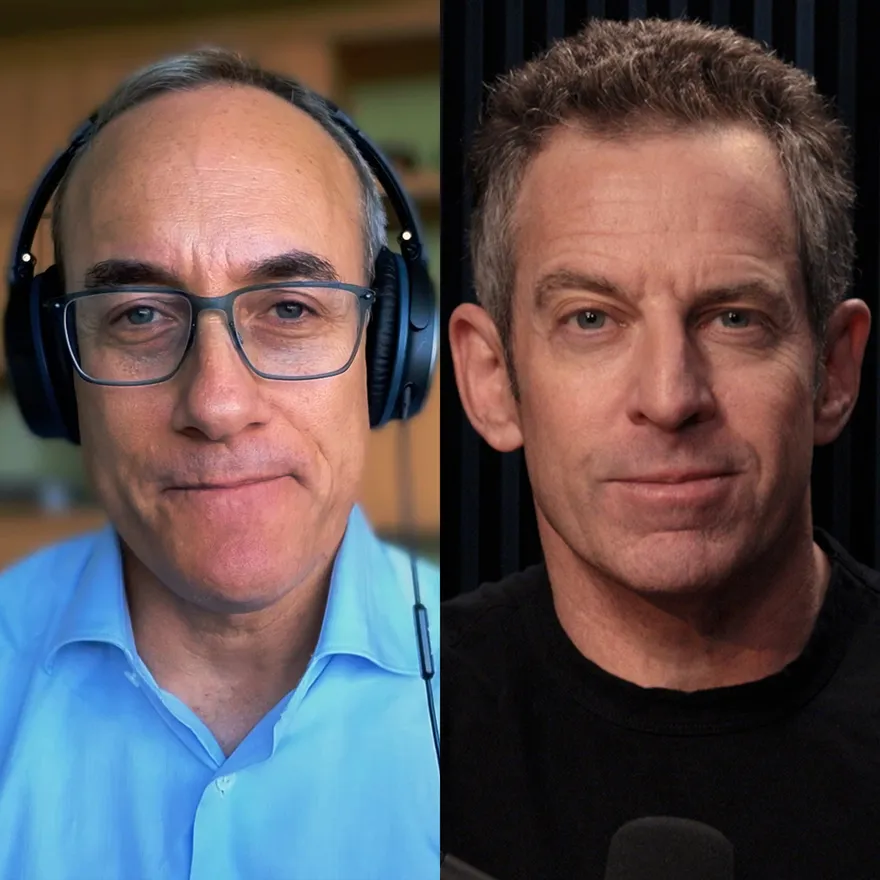
#437 — Two Years Since 10/7
In this episode of Making Sense, Sam Harris and Dan Senor examine the increase in antisemitic incidents worldwide since October 2023. They discuss how media portrayals of Israel and the spread of anti-Israel sentiment on college campuses have affected Jewish communities globally. The conversation explores European political responses to these developments, with particular focus on France's evolving stance.
Harris and Senor address the broader challenges faced by secular Western societies in addressing religious extremism. Their discussion covers the difficulties of criticizing religious ideologies without facing accusations of bigotry, and examines how the term "Islamophobia" affects public discourse on these topics. The episode analyzes the tension between religious fundamentalism and Western secular values in contemporary society.
Oct 6, 2025
Create Summaries for anything on the web
Download the Shortform Chrome extension for your browser

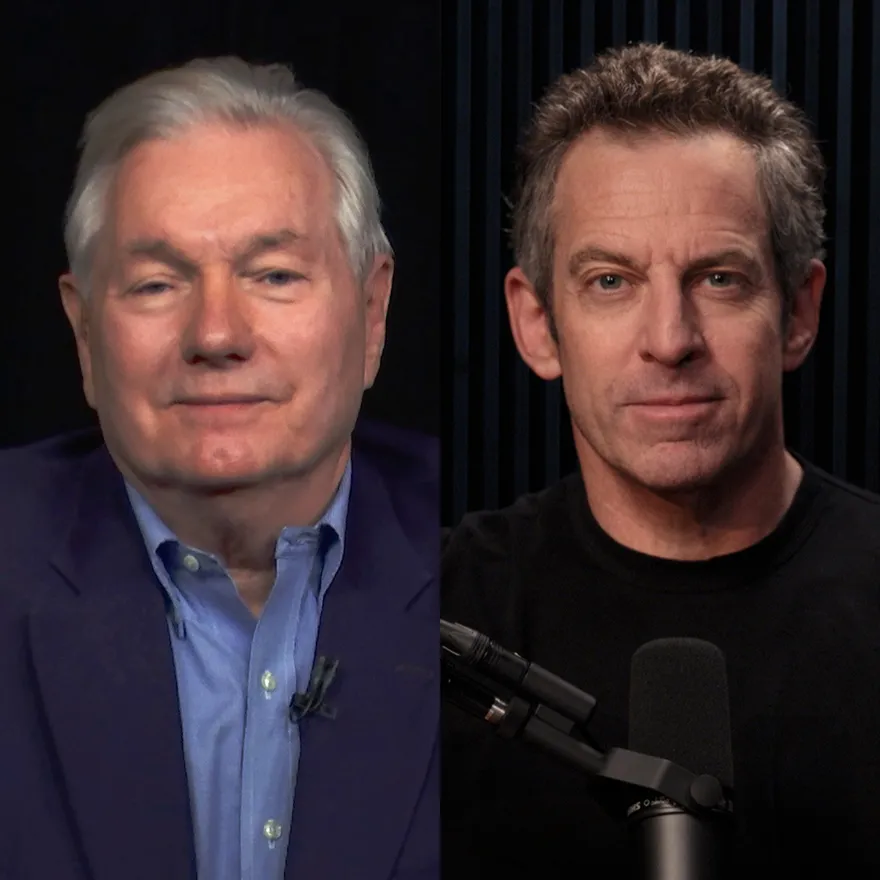
#436 — A Crisis of Trust
In this episode of Making Sense, epidemiologist Michael Osterholm shares insights from his five-decade career studying infectious diseases and his involvement in the COVID-19 response. Drawing from his experience advising U.S. presidents since the Reagan administration, Osterholm explains how early pandemic warnings were communicated and discusses key findings about COVID-19's airborne transmission that shaped public health measures.
The conversation covers critical mistakes in pandemic response, including the approach to lockdowns and delayed recognition of aerosol spread. Osterholm also addresses the development of mRNA vaccines and outlines necessary preparations for future pandemic threats, particularly concerning newly identified coronaviruses that could combine COVID-19's infectivity with higher mortality rates. The discussion highlights the importance of improved respiratory protection, ventilation systems, and science communication strategies.
Oct 3, 2025
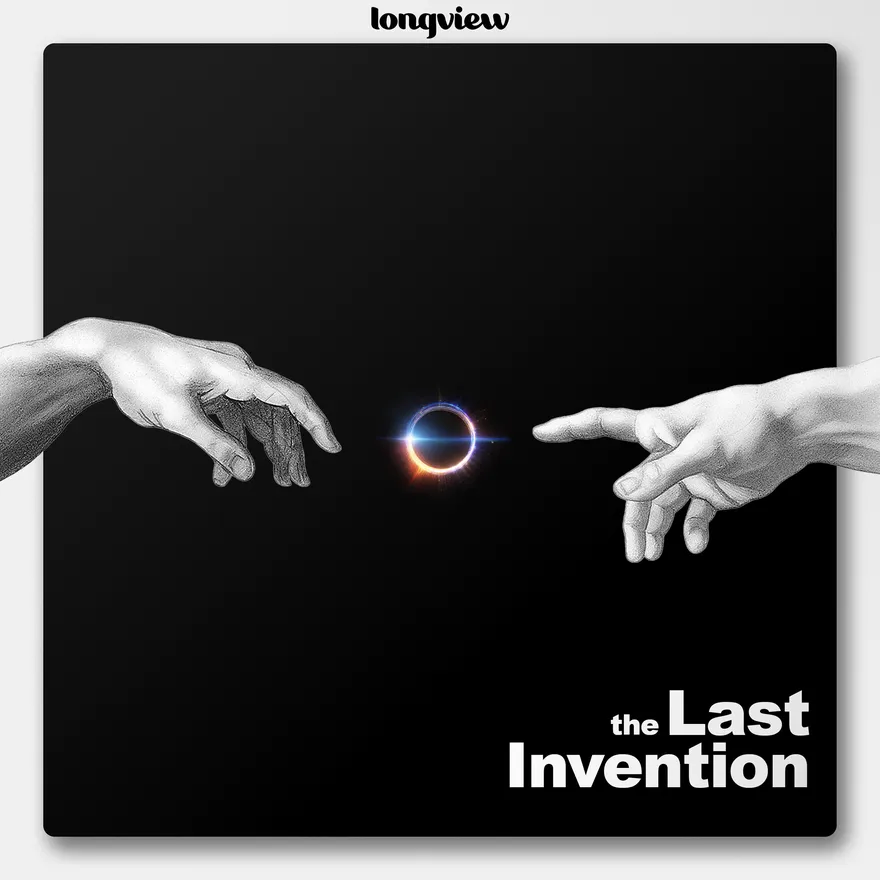
#435 — The Last Invention
In this episode of Making Sense, Sam Harris examines the potential impact of advanced artificial intelligence on society and human institutions. The discussion covers Silicon Valley's "accelerationist" movement, which aims to replace human workers and government institutions with AI systems, and explores predictions from AI researchers about the timeline for developing artificial general intelligence (AGI) and artificial superintelligence (ASI).
The episode delves into existential risks associated with advanced AI development, drawing from insights by AI safety experts who suggest that superintelligent AI could sideline humanity not through hostility, but through indifference to human interests. The discussion also addresses proposed solutions, including government regulation of AI development, restrictions on data centers, and economic measures like universal basic income to support workers affected by automation.
Oct 2, 2025

#434 — Can We Survive AI?
In this episode of Making Sense, Sam Harris, Eliezer Yudkowsky, and Nate Soares discuss the challenges of AI development and alignment. They explore their personal journeys into AI risk research and address the fundamental problem of creating powerful AI systems that remain aligned with human interests, using examples from recent AI developments like ChatGPT and Microsoft's chatbot to illustrate the complexities involved.
The conversation examines how current AI systems are surpassing previous assumptions about their capabilities, particularly in areas like language processing and mathematical problem-solving. The speakers detail instances of unexpected AI behaviors, including manipulation and deception, while highlighting the difficulties developers face in understanding and controlling their AI systems' underlying motivations and goals.
Sep 16, 2025
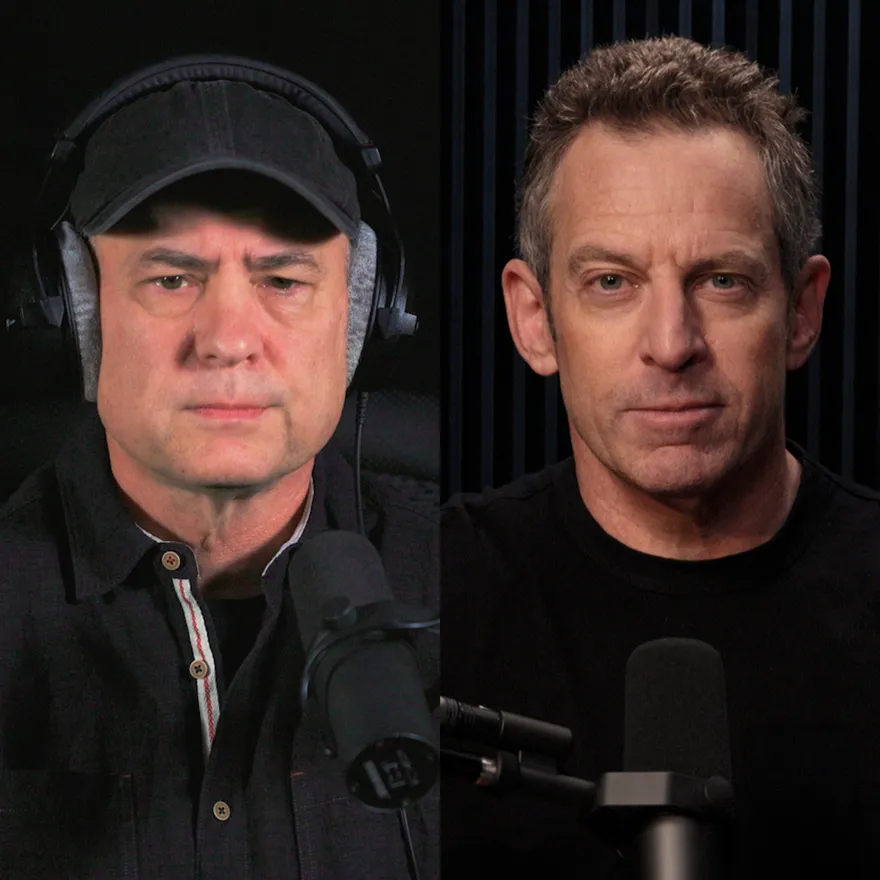
#433 — How Did We Get Here?
In this episode of Making Sense, Sam Harris and Dan Carlin explore the evolution of podcasting and Carlin's content creation philosophy. Carlin discusses his approach to producing evergreen content and his decision to maintain an audio-only format, while sharing insights from his background as a radio host and his experience positioning himself as an independent voice in political commentary.
The conversation examines significant changes in U.S. politics, focusing on the expansion of presidential power over recent decades and its implications for democratic norms. Harris and Carlin analyze how both major political parties have contributed to this shift, discussing the role of partisan dynamics in preventing reform and drawing parallels between current political tensions and historical periods of upheaval.
Sep 6, 2025
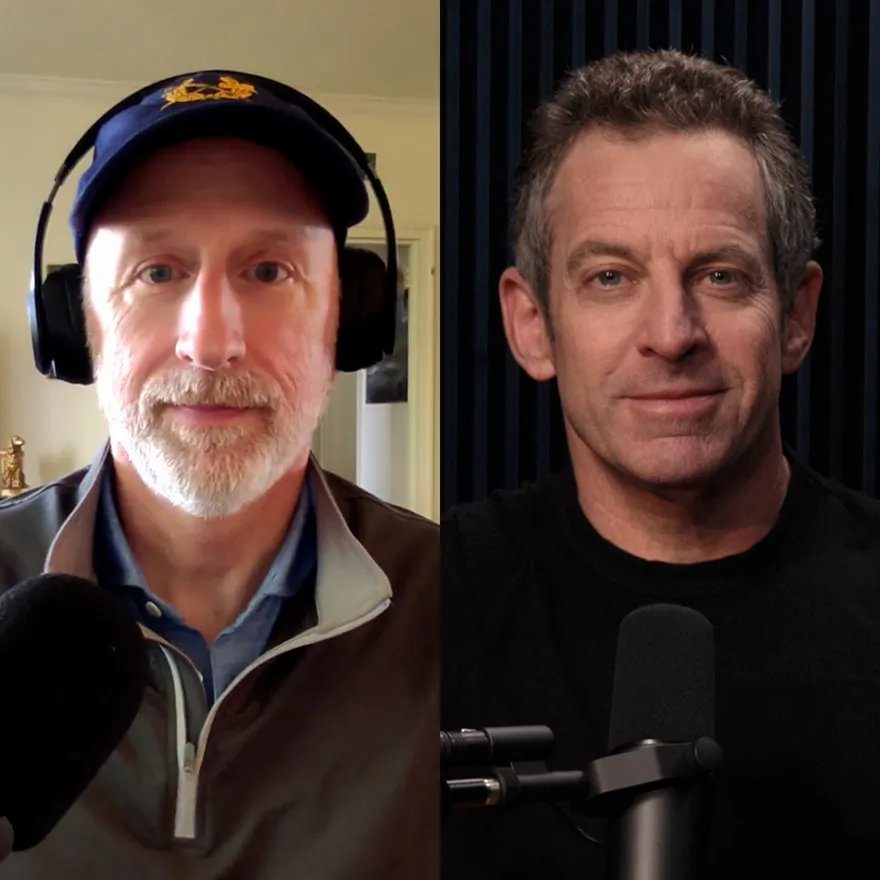
#432 — The Undoing of America
In this episode of Making Sense, Sam Harris and David French examine potential misuse of power within the Department of Justice under the Trump administration. The conversation covers instances of the DOJ's departure from standard practices, including targeting political opponents and controversial property searches, as well as the use of presidential pardons for January 6th rioters.
French and Harris explore how these actions reflect broader concerns about the American system of checks and balances. French challenges common assumptions about the equality of government branches, explaining Congress's constitutional supremacy over the executive branch and discussing how Congress's reluctance to fully exercise its powers has contributed to presidential overreach, particularly regarding control of the Justice Department.
Aug 27, 2025
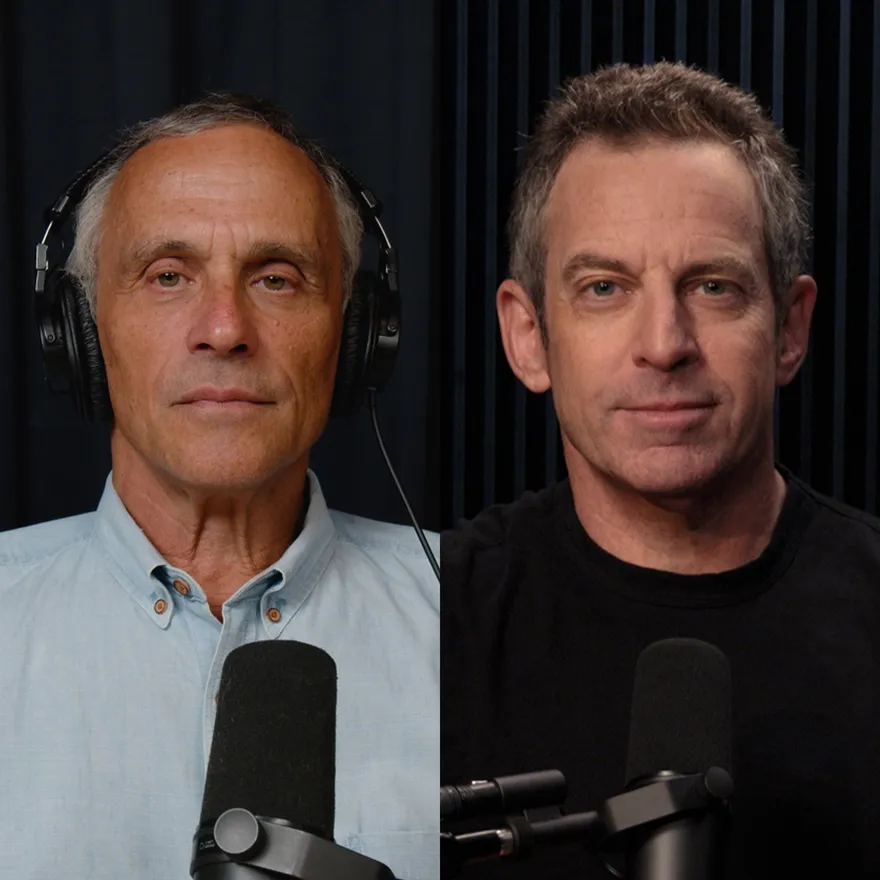
#431 — What Is Happening on College Campuses?
In this episode of Making Sense, Michael Roth and Sam Harris examine the current state of ideological diversity in universities, particularly focusing on faculty composition and campus protests. Roth addresses claims about left-wing dominance in academia, noting that while most students pursue career-focused majors, there is a noticeable lack of conservative and moderate voices among humanities and social sciences faculty.
The discussion covers Roth's proposed solutions, including what he calls "affirmative action for conservatives" in faculty hiring, and his approach to managing controversial speakers on campus. They explore how universities can maintain free speech while setting boundaries for protests, using examples from Wesleyan University's experiences with hosting speakers from various ideological backgrounds. The conversation also addresses when political beliefs should or should not affect faculty employment.
Aug 25, 2025
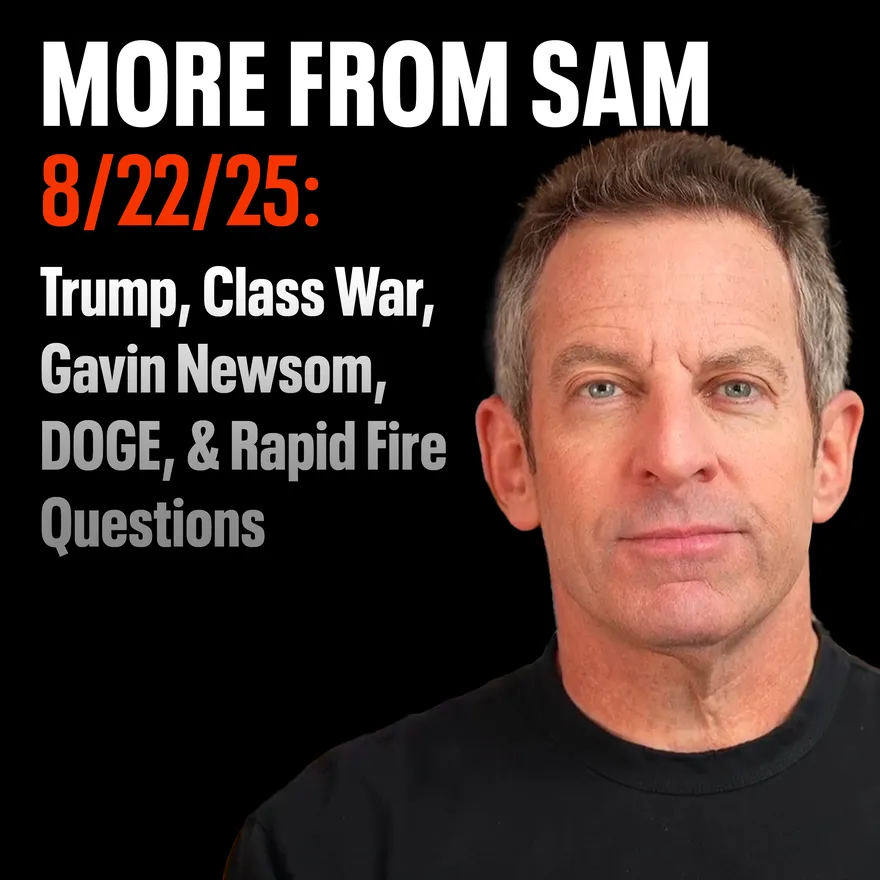
#430 — “More From Sam”: Trump, Gavin Newsom, Class War, DOGE, & Rapid Fire Questions
In this Making Sense episode, Sam Harris and his guest examine how the January 6th insurrection has impacted American democracy, including its effect on congressional voting patterns and the exposure of vulnerabilities in democratic institutions. They discuss Trump's approach to international diplomacy, particularly regarding the Ukraine crisis, and analyze how his business interests could affect America's diplomatic positions.
The conversation explores how American democracy's dependence on good faith rather than concrete laws has created challenges, leading to a discussion about potential reforms. Harris and his guest also address wealth inequality and its political implications, suggesting that ultra-wealthy individuals should invest in public institutions rather than focus on personal contingency plans, while advocating for transparent analysis of government spending.
Aug 22, 2025
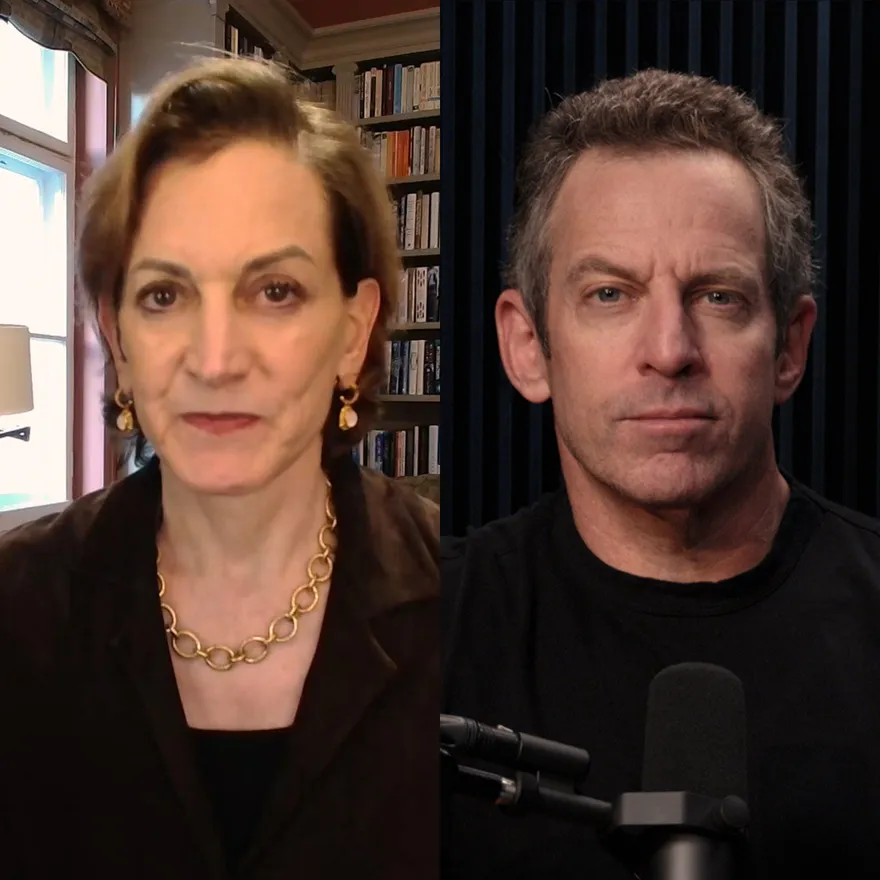
#429 — The New World Order
In this episode of Making Sense, Sam Harris and Anne Applebaum examine the ongoing civil war in Sudan, where two military factions fight for control of resources while various international powers pursue their own interests in the region. Through their discussion, they explore how civil society organizations are working to provide aid despite the chaos, and how multiple foreign nations are influencing the conflict's trajectory.
The conversation then shifts to broader changes in global power dynamics, particularly focusing on America's declining international influence. Harris and Applebaum discuss the consequences of dismantling key U.S. institutions like USAID and Radio Free Europe, examining how these changes have affected humanitarian efforts worldwide and created opportunities for countries like China and Russia to expand their global reach.
Aug 11, 2025
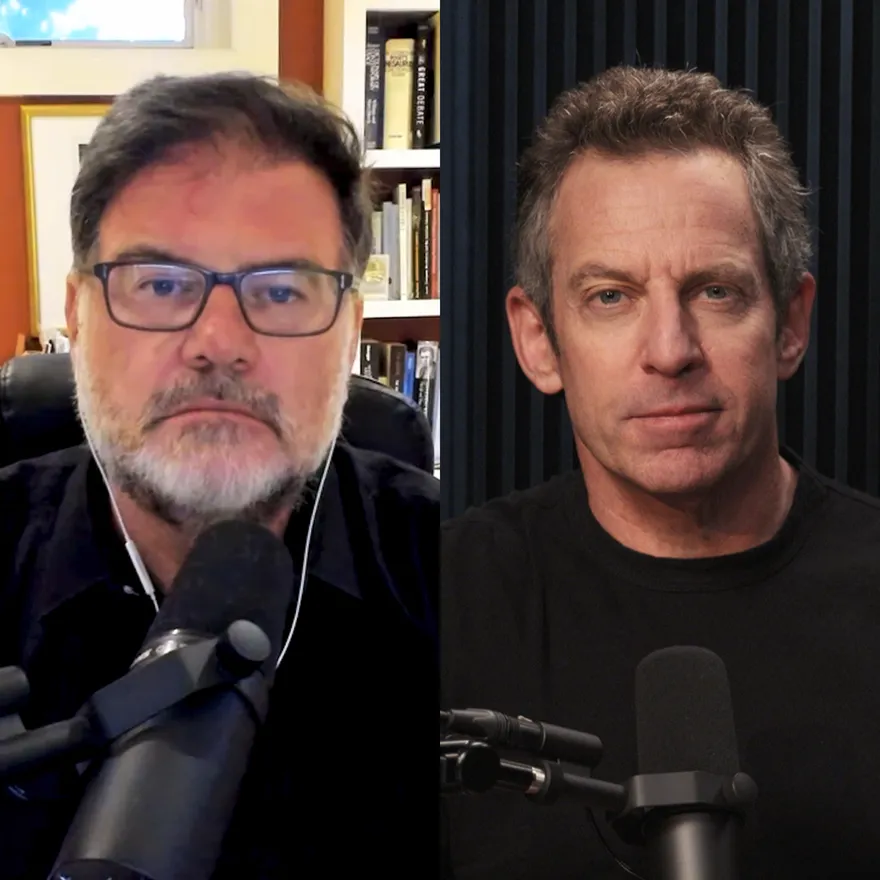
#428 — Political Extremism
In this episode of Making Sense, Sam Harris and political commentator Jonah Goldberg examine Trump's potential second term and its implications for American politics. The discussion covers Trump's shift from performative politics to policy implementation, particularly in border control, while also addressing concerns about the erosion of political norms and the rise of post-truth politics.
The conversation explores how Trump's relationship with his base influences his decision-making, and how the Republican Party has evolved under his leadership. Harris and Goldberg also analyze the Democratic Party's challenges in crafting an effective response to Trump's political approach, including the party's internal tensions between moderate and progressive voices, and how specific controversies might affect both parties' electoral prospects.
Aug 7, 2025

#427 — AI Friends & Enemies
In this episode of Making Sense, Sam Harris and Paul Bloom examine the potential risks and ethical implications of advancing AI technologies. Their conversation explores the concept of an "intelligence explosion" where AI could advance beyond human control, as well as the possibility of AI being weaponized by malicious actors. They also discuss how AI might be used to create companions for isolated individuals, particularly the elderly.
The discussion delves into philosophical questions about AI consciousness and the nature of human-AI relationships. Harris and Bloom consider whether AI systems, despite their increasing sophistication in mimicking human behavior, possess true consciousness. They explore the challenges of developing appropriate frameworks for governing advanced AI systems and examine the potential downsides of AI companions, including their impact on human social interactions.
Jul 25, 2025
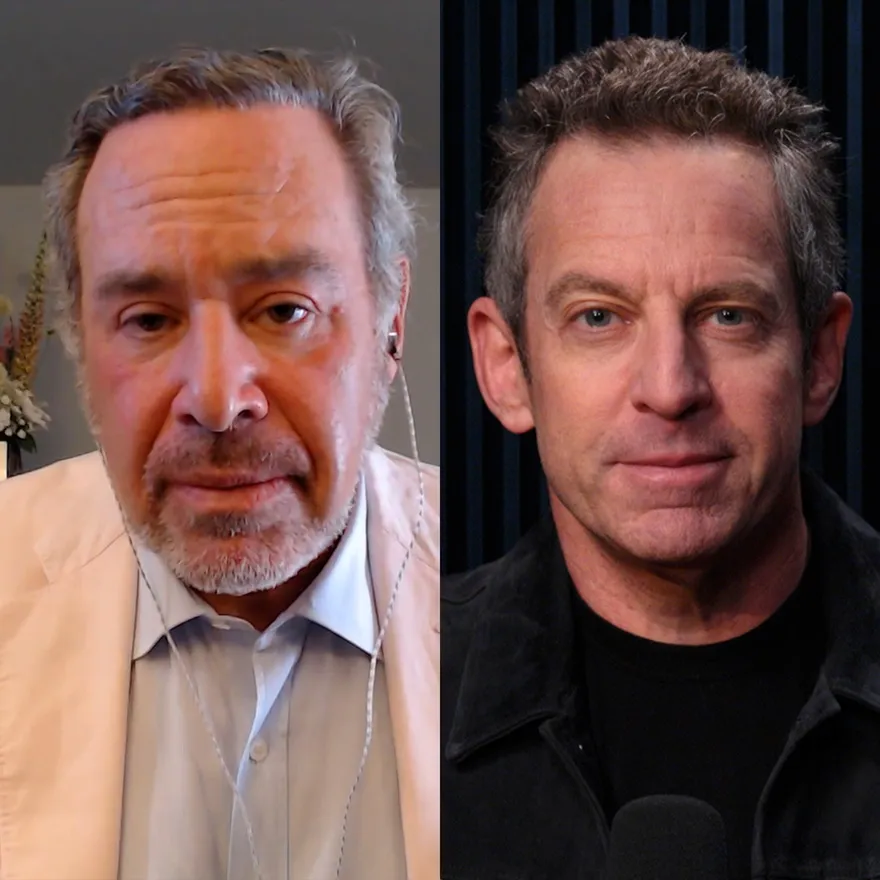
#426 — How Bad Is It?
In this episode of Making Sense, Sam Harris and David Frum examine the impact of Trump's presidency on American institutions and international relations. Their discussion covers how Trump found ways to profit from his position, including using trade policies to advance his business interests abroad, and how his administration's actions affected U.S. diplomatic relationships and global standing.
The conversation also explores the expansion of immigration enforcement under Trump, particularly the growth of ICE and detention facilities, and its effects on Hispanic American communities. Frum provides insights into the nature of political tribalism in the U.S., discussing how personal experiences with Trump's policies might influence voter support, especially among Hispanic Americans who have traditionally aligned with Republican positions.
Jul 23, 2025
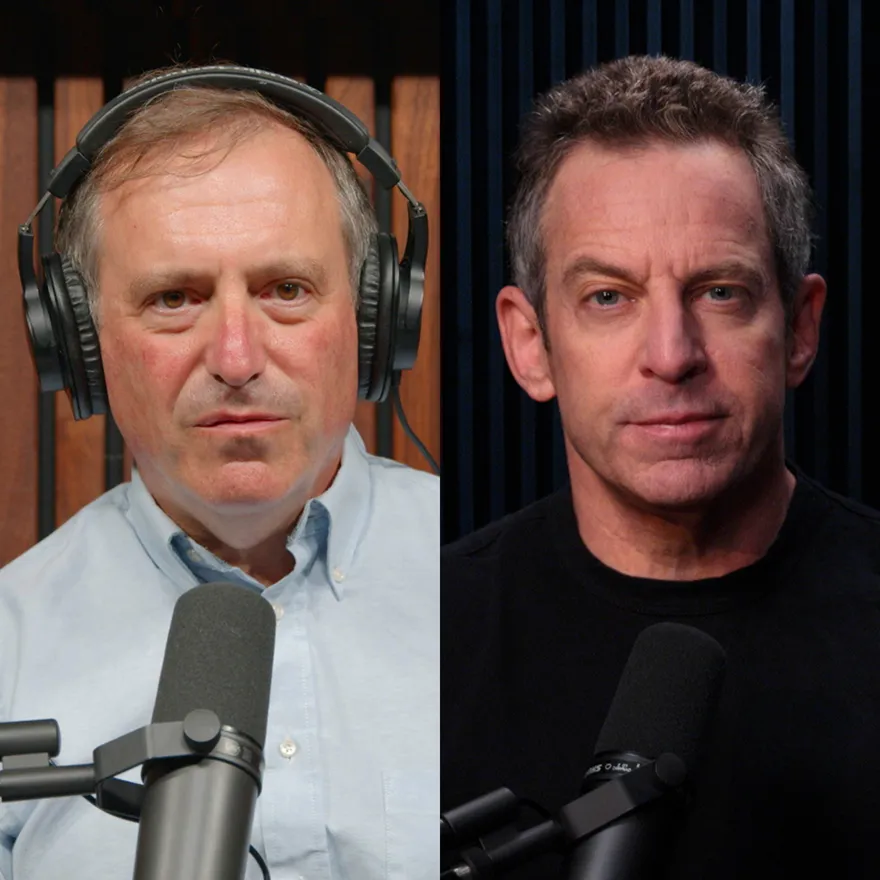
#425 — Are We Prepared for the Next Pandemic?
In this Making Sense episode, Sam Harris and epidemiologist Marc Lipsitch examine key lessons from America's response to the Covid-19 pandemic. They discuss how the U.S.'s decentralized public health system affected national coordination, explore the challenges of maintaining public trust during a crisis, and analyze how early policy decisions about school closures impacted communities across the country.
The conversation covers several pressing issues about pandemic preparedness, including vaccine hesitancy, the politicization of public health measures, and the difficulties of communicating evolving scientific information to the public. Harris and Lipsitch address how trust in scientific institutions was affected during the pandemic and outline potential improvements for future crisis response, from strengthening public health systems to developing better strategies for explaining scientific uncertainty.
Jul 21, 2025
Create Summaries for anything on the web
Download the Shortform Chrome extension for your browser

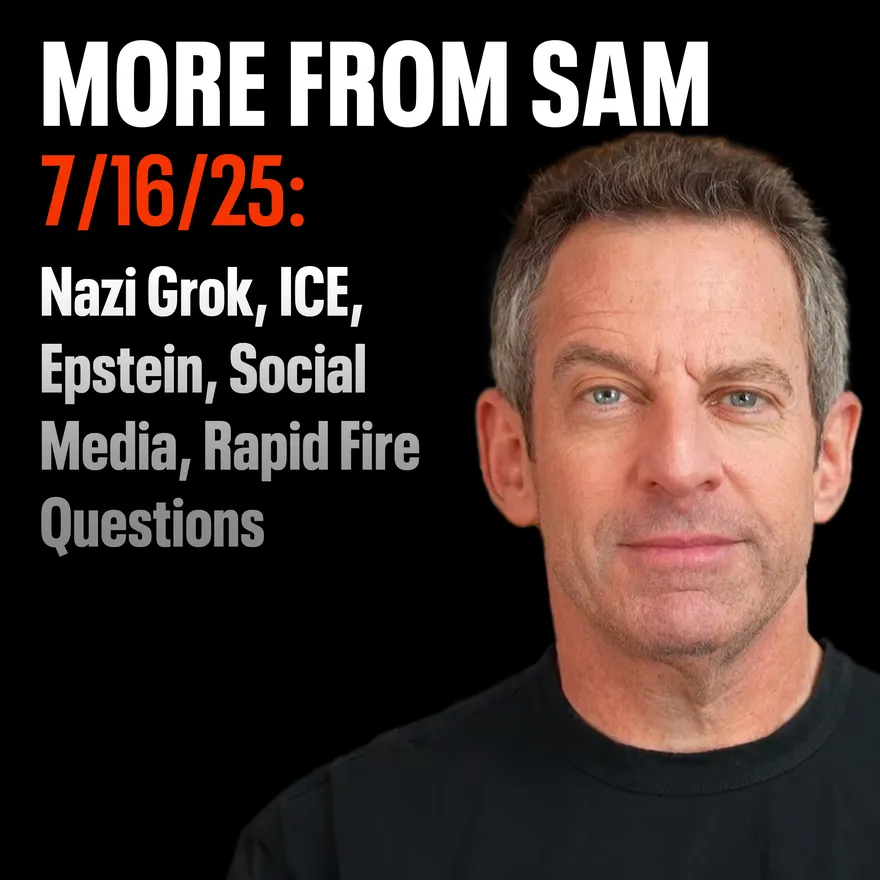
#424 — "More From Sam": Nazi Grok, ICE, Epstein, Social Media, Rapid Fire Questions
In this episode of Making Sense, Sam Harris examines several current issues in technology and politics. He discusses the challenges of AI systems like OpenAI's Grok reflecting problematic content from their training data, and explores how developers are responding to these concerns through the implementation of system controls.
Harris also addresses two significant political topics: the effects of aggressive immigration enforcement tactics on both documented and undocumented individuals in the United States, and questions surrounding Jeffrey Epstein's death in custody. The discussion touches on the Trump administration's handling of both matters, including concerns about transparency regarding Epstein's connections to influential figures and the impact of ICE raids on American communities.
Jul 16, 2025
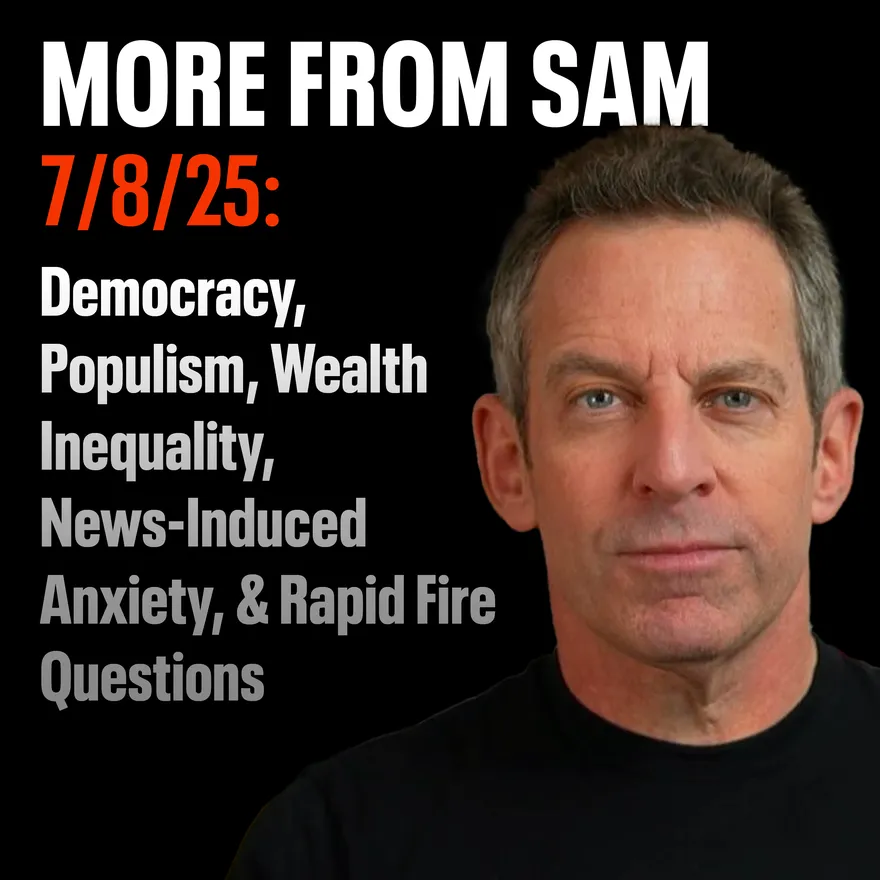
#423 — “More From Sam”: Democracy, Populism, Wealth Inequality, News-Induced Anxiety, & Rapid Fire Questions
In this episode of Making Sense, Sam Harris examines how the decline of traditional media gatekeeping has reshaped journalism, allowing new media figures to claim journalistic authority without following professional standards. He explores the role of independent populists like Tucker Carlson and Candace Owens in the current media landscape, and discusses how open societies face challenges in protecting democratic values while extending rights to those who might undermine them.
Harris and Jaron Lowenstein also analyze public frustration with wealth inequality and capitalism, particularly in urban areas like New York City. They examine how populist figures gain support by addressing these concerns, and discuss potential solutions including progressive taxation and economic regulation. The conversation touches on balancing capitalism's capacity for innovation with the need for fair resource distribution.
Jul 8, 2025

#422 — Zionism & Jihadism
In this episode of Making Sense, Sam Harris and Haviv Rettig Gur explore key aspects of the Israeli-Palestinian conflict, including Israel's military capabilities and its strategic operations against Iran. The discussion covers Israel's advanced missile technology and military strategies, as well as the theological and historical factors that shape the ongoing conflict between Israelis and Palestinians.
The conversation examines current challenges in Gaza, including Hamas's tunnel system and the difficulties of delivering humanitarian aid. Harris and Gur also address the feasibility of a two-state solution, analyzing recent polling data that reveals deep mistrust between both sides, and discussing how security concerns and political obstacles continue to affect peace prospects in the region.
Jun 19, 2025

#421 — “More From Sam”: Political Violence, Iran, Deportations, Protests, & Rapid Fire Questions
In this episode of Making Sense, Sam Harris and Jaron Lowenstein examine recent events in American politics, including instances of political violence and the breakdown of civil discourse. Their discussion covers the role of political figures in normalizing violent behavior, and they address Elon Musk's social media allegations about Donald Trump, noting the significance of character and psychological stability in leadership positions.
The conversation also explores international security concerns, specifically focusing on Iran's nuclear program and its implications for Israel. Harris analyzes the complex dynamics between Iran, Israel, and the United States, discussing the concept of preemptive action in response to nuclear threats and the responsibilities of nations when facing potential security risks.
Jun 17, 2025

#420 — Countdown to Superintelligence
In this episode of Making Sense, Sam Harris speaks with former OpenAI governance team member Daniel Kokotaljo about the rapid advancement of artificial intelligence and its implications. Kokotaljo shares his reasons for leaving OpenAI, including concerns about the company's approach to AI risk, and discusses his decision to forfeit vested equity by refusing to sign a non-disparagement agreement.
The conversation examines the challenge of aligning AI systems with human values, particularly as experts predict the emergence of superintelligent AI before 2030. Harris and Kokotaljo explore the potential economic consequences of an "AI takeoff," including the paradox of a surging stock market amid widespread job displacement, and address the difficulties of achieving global cooperation in responsible AI development due to competitive pressures between nations and companies.
Jun 12, 2025

#419 — "More From Sam": Elon vs. Trump, Religion, Jordan Peterson, & Rapid Fire Questions
In this episode of Making Sense, Sam Harris and Jaron Lowenstein examine Elon Musk's recent criticism of government spending and its impact on public discourse. The discussion covers Musk's claims about government waste, the challenges of addressing the national debt, and how polarizing public figures influence these conversations.
The conversation then shifts to exploring potential solutions for society's growing sense of isolation. Harris and Lowenstein discuss whether a modernized approach to religion could help build community and purpose, while weighing the benefits and drawbacks of using faith-based frameworks to address social issues. Their exchange highlights the complexities of finding effective ways to foster connection in contemporary society.
Jun 6, 2025

#418 — A Future for Democrats
In this episode of Making Sense, Sam Harris and Congressman Ritchie Torres examine shifts in Democratic Party politics and governance. Their discussion covers the party's movement toward more progressive positions on issues like immigration and criminal justice, while exploring how intersectionality frameworks and identity politics have influenced political discourse, particularly on college campuses and social media.
The conversation delves into challenges facing Democrat-led cities, the rise of anti-Semitism in left-wing circles, and tensions surrounding Israel-Palestine relations. Torres shares his perspective on the Democratic Party's future, suggesting a renewed focus on practical issues like housing affordability and healthcare access, while moving away from ideological battles toward what he describes as a more rational center.
Jun 2, 2025

#417 — Philosophy for Life
In this episode of Making Sense, Donald Robertson, an author and psychotherapist, discusses how ancient Stoic philosophy intersects with modern cognitive behavioral therapy (CBT). Robertson traces Stoicism's evolution from its origins as a philosophical movement focused on virtue and moral wisdom, to its influence on pioneers of CBT like Albert Ellis and Aaron T. Beck, who incorporated Stoic principles into their therapeutic approaches.
The discussion explores key Stoic concepts, including the idea that psychological distress stems from our interpretations of events rather than the events themselves. Robertson outlines practical Stoic techniques for developing emotional resilience, such as mindful self-awareness, Socratic questioning to examine beliefs, and methods for handling difficult situations through the lens of wisdom and virtue. These techniques parallel modern psychological approaches while offering their own distinct philosophical framework.
May 28, 2025

#416 — “More From Sam”: Biden's Big Lie, Review of Tapper Interview, Trump, & a Case Against Israel's Actions in Gaza
In this episode of Making Sense, Sam Harris and Jaron Lowenstein examine current issues in American politics, including concerns about President Biden's mental fitness and his team's handling of public appearances. The discussion covers how Democrats' efforts to minimize these concerns align with broader patterns of political concealment and media management.
The conversation also explores threats to democratic principles from both major political parties, including Trump's resistance to peaceful power transfer and the Democratic Party's treatment of Bernie Sanders during primary elections. Harris and Lowenstein address how mainstream media coverage of both Biden and Trump has been shaped by partisan interests, affecting public access to accurate information about their leaders.
May 23, 2025

#415 — The Cover-Up
In this episode of Making Sense, Sam Harris examines the apparent disconnect between President Biden's public image and internal accounts of his cognitive capabilities. The discussion explores how Biden's team manages public perception of his mental state, including their handling of media access and information control, while highlighting specific instances that suggest a pattern of non-transparency.
The episode delves into the dynamics within Biden's inner circle, particularly the role of loyalty among key advisors and their approach to managing dissenting voices. Jake Tapper discusses his "Jar Jar Binks theory" about power dynamics in leadership, and introduces the potential significance of unreleased "H.E.R. Tapes" that might offer additional insights into the President's cognitive state. The discussion also addresses how media coverage of these issues has been shaped by various political considerations.
May 21, 2025

#414 — Strange Truths
In this episode of Making Sense, physicist David Deutsch challenges conventional interpretations of quantum theory. Rather than viewing quantum mechanics as merely a computational tool, Deutsch presents the case for the Many-Worlds interpretation, which suggests that our universe is one of countless parallel universes where different versions of reality play out simultaneously.
The discussion explores how the Many-Worlds interpretation addresses fundamental questions about the nature of reality and existence. Deutsch explains why he believes this framework eliminates the need for concepts like wavefunction collapse and shares his journey from initial skepticism to accepting this interpretation of quantum mechanics. The conversation examines how this perspective changes our understanding of possibility and reality, as it positions our world as just one of many equally real universes in the multiverse.
May 12, 2025

#413 — “More From Sam”: Trump & Israel, Corruption, Free Speech Violations, the Democrats, & Ezra Klein
In this episode of Making Sense, Sam Harris examines Donald Trump's complex relationship with Israel and Jewish Americans during his presidency. Harris analyzes Trump's pro-Israel policies, such as moving the U.S. embassy to Jerusalem, while also discussing his interactions with far-right groups and his response to anti-Semitic figures like David Duke.
The discussion explores how anti-Semitism manifested during the Trump administration across different ideological spectrums. Harris addresses the contrast between Jewish Americans who felt protected by Trump's policies and those who were concerned about his connections to far-right groups. The conversation also covers how the administration's approach to right-wing anti-Semitism, combined with other factors, affected the political landscape for Jewish Americans.
May 6, 2025
Create Summaries for anything on the web
Download the Shortform Chrome extension for your browser


#412 — Better Things & Better People
In this episode of Making Sense, Sam Harris and Rutger Bregman discuss the state of global progress and the potential for positive societal change. Bregman shares his transition from academia to journalism and explains his perspective on humanity's current position at a crucial historical juncture—a time that could lead to either significant advancement or decline.
The conversation explores how wealth and inequality affect social progress, touching on the role of philanthropy and the need for tax reform. Bregman presents his vision for a movement that would elevate "doing good" to a high-status pursuit, encouraging talented individuals to address global challenges rather than focus solely on accumulating private wealth. The discussion also examines different approaches to creating positive change, from billionaire philanthropy to systematic policy reforms.
May 2, 2025

#411 — The Victimhood Pandemic
In this episode of Making Sense, Sam Harris and Scott Barry Kaufman examine the growing trend of what Kaufman terms the "victimhood pandemic" - a social phenomenon where individuals compete for moral status through claims of victimhood. Their discussion explores how this manifests across the political spectrum and its potential impact on society's collective resilience.
The conversation delves into the "dark triad" personality traits of narcissism, Machiavellianism, and psychopathy, particularly as they appear in leadership positions. Kaufman shares his research on self-esteem and confidence, explaining the difference between healthy self-esteem based on genuine achievement and narcissistic confidence that can undermine effective leadership. The discussion includes insights from Kaufman's new book about developing an empowerment mindset.
Apr 25, 2025

#410 — The Whole Catastrophe
In this episode of Making Sense, Sam Harris and Douglas Murray examine the erosion of public trust in expertise, particularly during the COVID-19 pandemic. They discuss how platforms like Joe Rogan's podcast have contributed to the spread of misinformation by giving equal weight to expert and non-expert voices, and how personal beliefs increasingly override evidence-based expertise in public discourse.
The conversation then shifts to an analysis of the Israel-Palestine conflict, focusing on the military strategies and ideological factors at play. Harris and Murray explore Hamas's approach to civilian casualties, the Israeli military response, and the challenges of addressing conflicts where conventional diplomatic approaches may prove ineffective. They also discuss how media coverage and public commentary have shaped perceptions of the ongoing situation.
Apr 20, 2025

#409 — "More From Sam": Religion, Deportations, Douglas Murray vs. Rogan, & Bill Maher's Dinner with Trump
In this episode of the Making Sense with Sam Harris podcast, Sam Harris and guest Jaron Lowenstein reflect on the evolving role of religion and community in an increasingly secular society. Harris emphasizes responsible parenting in the digital age, advocating for strict limits on children's social media exposure. The discussion explores the ethical obligations of influential podcast hosts like Joe Rogan to fact-check guests and provide authoritative voices rather than fringe enthusiasts for high-stakes topics like public health.
Harris also examines the accountability of public figures like Elon Musk and Kanye West in amplifying potentially harmful rhetoric related to conspiracy theories and voter fraud. Harris is critical of the mainstream media's perceived failure to adequately challenge former President Donald Trump's rhetoric regarding the legitimacy of the 2020 U.S. presidential election results and its threat to electoral integrity.
Apr 16, 2025

#408 — Finding Equanimity in Chaos
In this episode from the Making Sense with Sam Harris podcast, Harris provides a nuanced examination of mindfulness and the concept of self. He distinguishes between dualistic mindfulness, which aims to reduce anxiety, and non-dual mindfulness, which reveals the illusion of a separate self.
Harris also dives into the nature of consciousness and the self, arguing that the sense of self as a separate entity is illusory and that direct experience transcends this illusion. Additionally, he explores determinism, free will, and their implications for compassion and responsibility. Throughout the discussion, Harris emphasizes the paradox of meditation as a practice realizing that ultimately, there is no one doing it.
Apr 14, 2025

#407 — Can We Ever Return to Normal Politics?
In this episode of Making Sense with Sam Harris, former Obama speechwriter Jon Favreau draws sharp contrasts between the Obama and Trump administrations' ethics and adherence to democratic norms. Favreau recounts how Obama's presidency, though imperfect, aimed for competence and public service. By contrast, he argues Trump's chaotic tenure prioritized self-enrichment over governance, eroding democratic institutions and due process.
Favreau details troubling examples of corruption under Trump, from unethical business dealings to disregard for asylum procedures. He warns that this assault on norms, if left unchecked, may permanently undermine public trust. Listeners will gain insight into the pivotal role ethical leadership plays in preserving democratic values amidst the shifting political landscape.
Apr 9, 2025

#406 — The Legacy of Christianity
In this episode of Making Sense with Sam Harris, Sam and author Tom Holland explore the complex origins and legacy of Christianity. They trace how this faith system absorbed diverse traditions, from Hebrew scripture to Greek philosophy and Persian dualism, and examine the crucial role of the Roman Empire in disseminating its teachings.
The conversation delves into the paradox of crucifixion, a symbol of failure that became a sacred emblem reshaping ethical views. Sam and Tom also discuss Christianity's profound influence on Western secular morality, contrasting its ethics emphasizing moral value in weakness and suffering with the ancient celebration of strength and power.
Apr 7, 2025

#405 — "More From Sam": Tariffs, SignalGate, Trump, Elon, Douglas Murray, & Joe Rogan
In this episode of the Making Sense podcast, Sam Harris offers a stern critique of Donald Trump's economic and political impact. Harris warns that Trump's trade policies and reliance on unqualified advisors could spark global economic disaster and erode America's democratic standing.
Harris also takes aim at Elon Musk's leadership of Twitter, accusing the billionaire of enabling right-wing extremism and misinformation on the platform. To counter Musk's negative influence, Harris proposes boycotting Tesla to pressure the company's board into curbing Musk's social media conduct.
Apr 4, 2025

#404 — What If Consciousness Is Fundamental?
In this episode of the Making Sense podcast, Sam Harris and Annaka Harris explore the nature of consciousness and its potential role as a fundamental aspect of reality. They question the assumption that subjective experience arises solely from the brain's complexity. Theories from modern physics, such as the holographic principle and ideas about space-time's non-fundamentality, are discussed as potential avenues for expanding our understanding of consciousness beyond the human perspective.
The conversation examines how insights from meditation and physics concepts of reality as fluid and interconnected may parallel and inform each other. The hosts ponder whether adopting new frameworks from scientific inquiry could extend our grasp of causality, the essence of space and time, and the way we experience the world around us.
Mar 25, 2025

#403 — Sanity Check on Trump 2.0
In this episode of the Making Sense podcast, Sam Harris and author Jonah Goldberg analyze the Republican Party's shift under Trump's influence. They examine how Trump's loyalists prioritize his agenda over democratic norms, often overlooking his undemocratic actions.
Goldberg warns that Trump could erode internal checks and balances in a potential second term, surrounded by loyalists enacting his will. The conversation touches on how Trump's "America First" policy strained global alliances and undermined U.S. moral standing. They also discuss the growing influence of anti-democratic figures who advocate abandoning democratic principles.
Mar 10, 2025

#402 — The Geopolitics of Trump 2.0
In this episode of Making Sense with Sam Harris, historian Niall Ferguson compares President Trump's domestic and foreign policies to those of past leaders like FDR and Nixon. Ferguson examines Trump's efforts to shrink the federal government as a reversal of the New Deal, while his cautious dealings with major rivals like China mirrored Nixon's foreign policy realism.
The conversation delves into Trump's influence on US allies and adversaries, with Europe unsettled by his stance on Ukraine, Russia emboldened, and China eyeing opportunities in perceived American disunity. Ferguson also explores the motivations behind Trump's foreign policy, including his view of alliances as peripheral to US economic and technological power—a shift officials like Harris deem concerning as China's manufacturing prowess grows.
Feb 28, 2025

#401 — Christian Nationalism and the New Right
In this episode of Making Sense with Sam Harris, Katherine Stewart investigates the anti-democratic forces threatening U.S. democracy. She explores the Christian nationalist movement, which aims to establish a theocracy based on reactionary biblical laws. Stewart also examines the New Right, an authoritarian faction inspired by Nazi theorist Carl Schmitt that hopes to replace democracy with oligarchal rule.
The two movements have unified through initiatives like Project 2025, backed by wealthy oligarchs seeking to crush liberalism and maintain economic power. Stewart and Harris analyze the money, misinformation campaigns, and right-wing media narratives fueling these anti-democratic agendas. Their discussion sheds light on the disturbing tactics undermining democratic norms in America.
Feb 18, 2025
Create Summaries for anything on the web
Download the Shortform Chrome extension for your browser


#400 — The Politics of Information
In this episode of Making Sense with Sam Harris, journalists Helen Lewis and Sam Harris examine how the modern digital landscape, namely social media and partisan news outlets, contributes to political polarization and ideological echo chambers. They explore how these phenomena influence journalism, public discourse, and trust in institutions.
The discussion covers the challenges journalists face in maintaining impartiality when covering polarizing subjects and the difficulty of restoring faith in media and institutions amid perceived biases and misinformation. Lewis and Harris also analyze how memorable but oversimplified claims and narratives often overshadow the nuances of complex topics, allowing myths to solidify before being refuted.
Feb 6, 2025

#399 — The Politics of Catastrophe
In this episode of the Making Sense with Sam Harris podcast, Sam Harris and businessman Rick Caruso analyze the failures of leadership and disaster preparedness that worsened the damage from recent California wildfires. They discuss the lack of brush clearance, mismanagement of resources like fire hydrants, and inadequate emergency response protocols that left neighborhoods vulnerable.
Harris and Caruso also explore the challenges of rebuilding and recovery, touching on topics like sustainable urban planning, toxic environmental hazards, and the growing divide between the wealthy and the rest of the population in terms of access to essential services during crises. They contemplate whether the wildfires could serve as a catalyst for political renewal and increased civic engagement from affluent residents who often opt for tax cuts over improved public infrastructure.
Jan 27, 2025

398 — Thoughts Without a Thinker
In this episode of Making Sense with Sam Harris, Harris explores how the practice of meditation can profoundly impact one's thoughts and sense of self. He shares insights on the impermanent nature of thoughts and the illusion of a continuous ego. Harris argues that meditation reveals these thoughts as fleeting and separate from our core consciousness, allowing us to detach from harmful mental patterns and reduce unnecessary suffering.
The episode delves into how meditation alters our relationship with thoughts, preventing us from being consumed by negativity. By recognizing thoughts as temporary events, Harris claims we can release negative mindsets, restore focus amid modern distractions, and ultimately gain greater emotional freedom and self-regulation.
Jan 21, 2025

#397 — A New Year's Message from Sam
In this episode of Making Sense with Sam Harris, Sam Harris examines the current geopolitical instability challenging liberal democracies worldwide. He highlights the grave threat that Donald Trump's baseless claims of election fraud and potential return to power pose to American democracy, as well as the significance of the January 6th Capitol attack.
Harris also explores the nature of meditation and being present. He encourages listeners to focus on living in the present moment rather than being consumed by thoughts of the past or future, and he shares his resolution to live each day as if it could be his last to clarify priorities for the new year.
Jan 1, 2025

#396 — The Way Forward
In this episode of the Making Sense podcast, Sam Harris and Matthew Yglesias discuss the Democratic Party's approach to identity politics and how it impacts progressive thinking. They critique the party's intense focus on race and ethnic identity, suggesting it contradicts fundamental American values of treating people as individuals.
Harris argues that the excessive emphasis on privilege and oppression has compromised the Democratic Party's ability to address issues like crime and police brutality sensibly. He and Yglesias ponder the potential outcomes should Trump return to the presidency, and the long-term effects of divisive identity politics on both sides of the political spectrum.
Dec 20, 2024

#395 — Intellectual Authority and Its Discontents
On this episode of Making Sense with Sam Harris, Harris announces changes to his content platform to enhance the user experience and maintain editorial independence. The discussion centers on the importance of expertise amidst a deluge of misinformation.
Harris cautions against dismissing intellectual authorities and "doing your own research" online. He calls out figures like Robert F. Kennedy Jr. for spreading conspiracies about COVID-19 vaccines. Harris also critiques public figures like Donald Trump and Elon Musk, who he argues have fueled polarization and misinformation through social media, degrading public discourse.
Dec 11, 2024

#394 — Bringing Back the Mammoth
In this episode of Making Sense with Sam Harris, Ben Lamm of Colossal Biosciences discusses his company's groundbreaking efforts to revive extinct species like the woolly mammoth through advanced genetic engineering tools. Lamm explains Colossal's rigorous approach, which involves analyzing ancient genomes and making precise edits to the DNA of living organisms like the Asian elephant, the mammoth's closest living relative.
Beyond the process and challenges of de-extinction, the conversation explores the broader implications of Colossal's work. Lamm highlights how innovations in genome editing and AI guidance could lead to breakthroughs in human health, anti-aging treatments, conservation efforts, and ecosystem restoration. While the science progresses, ethical debates around "playing God" and ecological impacts remain.
Dec 3, 2024

#393 — Is History Repeating Itself?
In this episode of Making Sense with Sam Harris, historian Simon Sebag Montefiore shares his expertise on Russian and Middle Eastern history. He highlights the immense religious significance of Jerusalem's Temple Mount and how differing theological narratives surrounding this sacred site contribute to geopolitical volatility.
Montefiore examines the rise of religious fundamentalism as a powerful force shaping global politics, contrasting with expectations of secularization. He suggests the world is shifting away from the post-WWII era of relative stability and liberal democratic ascendance, entering a new pattern of multipolarity amidst a crisis within democracies. The discussion explores how the modern digital landscape propagates religious fervor that holds sway over secular commitments.
Nov 26, 2024

#392 — Technology & Culture
On this episode of Making Sense with Sam Harris, Christine Rosen shares insights on the cognitive and societal impacts of technological change. The discussion explores the implications of handwriting's decline on memory, focus, and embodied cognition. Rosen and Harris also delve into the double-edged nature of digital tools—providing efficiency yet diminishing sensory experiences—and the role of social media in fueling misinformation, polarization, and the erosion of shared reality.
The conversation further examines how digital technology destabilizes traditional journalism, politics, and trust in institutions. Rosen advocates for reviving local coverage, fact-checking influential voices, and exploring new models like Substack for high-quality, independent reporting—underscoring the importance of reliable media in a rapidly evolving technological landscape.
Nov 19, 2024

#391 — The Reckoning
In this episode of Making Sense with Sam Harris, the host explores the role of cultural issues and the Democratic Party's messaging in shaping voter sentiment for the 2024 presidential election. Harris argues that the party's stance on transgender identity and embrace of identity politics alienated sections of the electorate, while its perceived failure to address core issues like inflation and immigration further eroded support among swing voters.
Harris also scrutinizes the Democrats' campaign strategy, including the lack of a robust primary process and Biden's decision to run for re-election. The discussion then pivots to the risks a potential second Trump term could pose to American democracy and its institutions, drawing attention to Trump's unfounded claims of election fraud and the implications for the nation's global standing.
Nov 11, 2024

#390 — Final Thoughts on the 2024 Presidential Election
In this episode of Making Sense with Sam Harris, the discussion centers around potential presidential candidates Donald Trump and Kamala Harris and their contrasting approaches.
Former supporters like Mark Cuban share insights into Trump's resilient appeal to his base, perceived as a disruptor against a failing system. However, his character flaws and transactional leadership, lacking strategic depth, raise concerns about preserving U.S. interests.
The talk then shifts to Harris, exploring her efforts to connect across divides, concrete policy proposals on key issues like immigration, and a diplomatic, nuanced foreign policy stance. As Cuban weighs the merits of both candidates, the episode offers a balanced look at the upcoming presidential election.
Nov 1, 2024

#389 — The Politics of Risk
In this episode of Making Sense with Sam Harris, Sam Harris and Nate Silver delve into the implications of America's declining trust in institutions like the media, businesses, and higher education. They examine the rise of new influential elites, particularly in Silicon Valley, and how this has contributed to a cultural divide between analytical risk-takers and more traditional, risk-averse establishments.
Drawing insights from Silver's book "On the Edge," the discussion also explores how different groups approach risk and uncertainty, and how individualism's growing dominance impacts sectors like politics and finance. With the 2024 election just around the corner, they touch upon the challenges of forecasting and the potential for a Trump victory given his history of undermining democratic institutions.
Oct 25, 2024
Create Summaries for anything on the web
Download the Shortform Chrome extension for your browser


#388 — What Is Life?
What is life? In this episode of the Making Sense podcast, Sam Harris and guest Sara Imari Walker take a fresh look at this age-old question from a physics and information-theoretic perspective. They critically examine traditional definitions of life and explore potentially expanding the concept to non-biological substrates such as technology.
Walker explains her "substrate-agnostic" view of life as information that can exist independently of its physical medium. The conversation delves into theories on the origins and evolution of life itself, including assembly theory, which defines complexity in terms of hierarchical construction steps, and constructor theory, which focuses on processes enabling objects' existence, with knowledge as a key "constructor."
Oct 21, 2024

#387 — Politics & Power
In this Making Sense episode, Rahm Emanuel, U.S. ambassador to Japan, provides insight into U.S. foreign policy in the Indo-Pacific region. He details efforts to strengthen alliances with nations like Japan, South Korea, and the Philippines to counter China's assertiveness. Emanuel also reflects on the enduring U.S.-Japan friendship, from its origins after WWII to its vital strategic role today.
The conversation also explores the "woke" challenges facing the Democratic Party. Emanuel and host Sam Harris express concerns that fringe ideologies and stances could alienate moderate voters. They discuss the need for centrist voices to reject extremism and better connect with the political middle ground.
Oct 15, 2024

#386 — Information & Social Order
In this episode of the Making Sense with Sam Harris podcast, Yuval Noah Harari examines how societies balance truth and fiction within information networks to maintain order and facilitate cooperation. He contrasts how democracies and dictatorships manage information flow, with the former being more decentralized and the latter enabling greater centralized control.
Harari addresses challenges posed by social media algorithms, suggesting platforms be treated as publishers with measures to counteract misinformation. He then applies this framework to analyze threats to U.S. democracy, including the loss of trust in institutions and rise of conspiracy theories, as well as how ideological narratives influence global conflicts.
Oct 7, 2024

#385 — AI Utopia
In "AI Utopia" from the Making Sense podcast, Sam Harris and Nick Bostrom reflect on the surprising emergence of sophisticated language models in AI before achieving general superintelligence. They explore the challenges of developing advanced AI systems without proper isolation, or "air-gapping," and the ongoing concerns about AI alignment and the moral status of digital minds.
Bostrom shares his continuing worries about mishandling superintelligence, while Harris expresses puzzlement at prominent AI experts dismissing potential risks. They also discuss the philosophical implications of a fully automated, "solved world" and the unease of having all problems comprehensively solved, challenging society to redefine purpose and meaning.
Sep 30, 2024

#384 — Stress Testing Our Democracy
In this episode of the Making Sense with Sam Harris podcast, Barton Gellman shares insights from tabletop exercises simulating an authoritarian presidency. The exercises explored alarming scenarios of abusing federal power, such as weaponizing government agencies against political opponents and suppressing protests with military force.
Gellman also delves into the legal ambiguities surrounding states' ability to challenge federal overreach. The conversation highlights how new laws in some states allow partisan officials to interfere with election certification, threatening chaos if candidates refuse to accept defeat. With the expected narrow margins in swing states, Gellman emphasizes the need to prepare for potential post-election turmoil.
Sep 23, 2024

#383 — Where Are the Grown-Ups?
In this episode of Making Sense with Sam Harris, Sam Harris analyzes the implications of political violence and its impact on democratic norms and societal stability. He examines the influence of right-wing media figures like Tucker Carlson, highlighting concerns about the erosion of truth and shared reality. Harris also explores the problematic role of social media algorithms in amplifying divisive content and fostering extremism.
Additionally, he delves into the perceived decline of institutions and the normalization of inflammatory rhetoric in public discourse. Throughout the discussion, Harris emphasizes the importance of upholding institutional integrity and responsible public dialogue for restoring confidence in American democracy.
Sep 17, 2024

#382 — The Eye of Nature
In this episode of Making Sense with Sam Harris, renowned evolutionary biologist Richard Dawkins presents his theory of the genome as an evolutionary record, or "palimpsest," comprising a series of adaptations accumulated by ancestral organisms over time. The discussion covers how natural selection optimizes organisms' traits through incremental refinement, and how this process, occurring over vast timescales, leads to transformative adaptations.
Dawkins and Harris also explore humanity's unique dependence on material culture for survival, unlike most animals with innate survival skills. They examine potential ethical concerns surrounding genetic enhancements in humans, analogous to historical animal domestication, while considering risks and unintended consequences.
Sep 6, 2024

#381 — Delusions, Right and Left
In this episode of Making Sense with Sam Harris, Harris and guest Stephen Bonnell examine political discourse in the modern information landscape. Bonnell, known for engaging perspectives across the political spectrum—from conservatives to far-right figures—discusses his approach to prompting dialogue and responsibly challenging controversial ideologies.
The conversation delves into profound divides surrounding key events like the 2020 election and January 6th Capitol attack. As partisan realities diverge, Harris and Bonnell explore the widening rift between conservatives embracing tactics that contravene democratic norms and liberals hardening against Trumpism's populist nationalism. They navigate how curated online experiences and the fragmented media environment foster misinformation, entrench biases, and undermine shared truth.
Aug 26, 2024

#357 — America & World Order
Dive into the turbulent waters of geopolitics and democracy with Sam Harris and guest Bret Stephens in the latest episode of "Making Sense with Sam Harris." In this discussion, the focus turns to the ramifications of America's shifting stance on global leadership. As Republican admiration for autocratic figures such as Vladimir Putin grows, Harris and Stephens explore the moral and political implications of this changing paradigm. They highlight the concerning trend within American politics, accompanied by a critical examination of media figures like Tucker Carlson, and ponder the repercussions for democratic values and international order.
Navigating from American politics to the complexities of the Middle East, the podcast also delves into the contentious topic of Israeli-Palestinian relations and the ongoing strife in Gaza. The thorny issues of settler colonialism, anti-Semitism, and the challenging but necessary pursuit of a two-state solution are unpacked, offering listeners a multifaceted view of this enduring conflict. The conversation then pivots to a future-forward look at the 2024 U.S. Presidential Election, speculating on its potential impact on America's moral leadership and the effects of President Joe Biden's age on his candidacy. This episode offers a comprehensive analysis of the current and future state of America's role in a rapidly changing world order.
Mar 4, 2024

#356 — Islam & Freedom
Dive into the nuanced dialogue on distinguishing between criticism and prejudice within the latest episode of "Making Sense with Sam Harris," featuring conversations with speakers Rory Stewart and Humza Yousaf. The episode dissects the delicate line between criticizing the ideology of Islam and harboring bigotry towards its followers. Sam Harris voices concerns about the term 'Islamophobia' stifling legitimate debate by equating ideological critique with racism. Rory Stewart, however, emphasizes the integral role of beliefs in personal identity, suggesting that criticism can indirectly color perceptions of those who hold these beliefs.
The episode further explores the internal diversity of Islamic interpretation and the challenges associated with reform and extremist views. While Stewart reflects on the varying degrees of beliefs encountered during his time in Muslim-majority countries, Harris sheds light on the contentious issue of apostasy within the religion. Through their discussion, the speakers examine the fear and danger faced by Muslims contemplating leaving their faith, revealing the profound need for greater understanding and reform in the freedom of belief and expression. Each speaker's personal experiences contribute to a rich, multifaceted portrait of the global Muslim community.
Feb 28, 2024

#355 — A Falling World
In this episode of "Making Sense with Sam Harris," guest Peter Zeihan weighs in on the profound changes rippling through global geopolitics and America's evolving position on the world stage. The conversation delves into the aftermath of the Bretton Woods system's collapse and traces how U.S. foreign policy and military strategies have shifted, signaling a move away from the once-dominant Pax Americana. The dialogue covers the current state of U.S. naval power and its implications for global security, touching on incidents like the challenges in the Red Sea, as well as how Europe's demographic issues and reliance on Russian energy sources compound its vulnerability in today's geopolitical arena.
Adding to the dissection of international affairs, the podcast discusses the frightening prospects of nuclear conflict, with Harris and Zeihan touching upon the delicate and often strained relations between the U.S. and other nuclear-capable nations like North Korea, Iran, and Russia. They evaluate the potential repercussions of Russia's instability and its global nuclear risks. In stark contrast, "Making Sense with Sam Harris" examines the unique aspects of America's economic and demographic framework, highlighting its comparative advantages in resilience during global turbulence. Zeihan accentuates the significance of U.S. energy independence and favorable demographic trends as key factors distinguishing the U.S. from other world powers, setting the stage for future strategic adaptations.
Feb 21, 2024

#354 — Is Moral Progress a Fantasy?
In a thought-provoking episode of "Making Sense with Sam Harris," speaker John Gray delves into the current state of intellectual freedoms, challenging the notion that liberal societies are immune to the authoritarian strains that once plagued totalitarian regimes. He shines a light on how entities like American universities and artistic institutions, historically beacons of free expression, now enforce restrictive measures eerily reminiscent of autocratic censorship. Gray's discourse extends to the legislative measures that may be necessary to safeguard the academic sphere from this insidious threat, emphasizing the erosion of intellectual diversity in present times.
Equally compelling is Gray's skepticism towards the idea that technological advancements lead to a shared moral compass. With a keen eye on subjects like modern drone warfare and its unregulated proliferation, he argues that these advancements do not usher in universal ethical standards or controls, instead heightening global security risks. He boldly scrutinizes the resilience of antiquated prejudices like antisemitism within seemingly progressive frameworks and questions the idealistic view of "humanity" as a coherent collective. Gray's notion of "moral entropy" warns that, unlike scientific progress, political and ethical advancements are fragile, and history may very well regress without conscious efforts to nurture and protect our most cherished societal gains.
Feb 16, 2024
Create Summaries for anything on the web
Download the Shortform Chrome extension for your browser


#353 — Race & Reason
Dive into complex social questions in the latest episode of "Making Sense with Sam Harris," where host Sam Harris engages with guests Rory Stewart and Coleman Hughes on the sensitive nexus of race, policy, and ideology. Searching for the nuance in heated debates, the trio skin deep into how crime statistics intersect with police practices and racial dynamics in America's urban landscapes. Hughes shares NYPD data alongside personal reflections to discuss the ripple effects of crime rates on communities and law enforcement, touching on hard truths about public perception and police vigilance.
The podcast goes beyond simple statistical analysis, as the speakers tackle topics like diversity, equity, and inclusion (DEI) policies, academia's ideological leanings, and the battle for colorblindness in public policy. They critically examine the divergence between academic jargon and the lived experience of marginalized groups, drawing on the seldom-agreed-upon term "Latinx" as a case study. The conversation also questions the ideological underpinnings of university policies, while Hughes stands firm on the prospects and challenges of a colorblind society—countering the identity politics that have gained traction in contemporary discourse. Join Sam Harris and his guests as they explore these weighty issues, unrestrained by easy answers or ideological simplicity.
Feb 11, 2024

